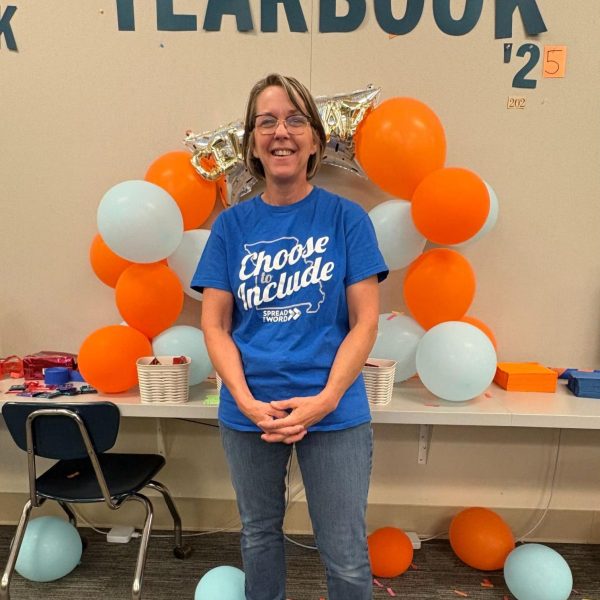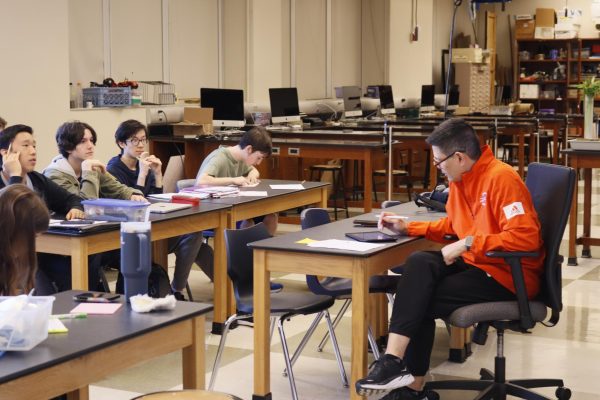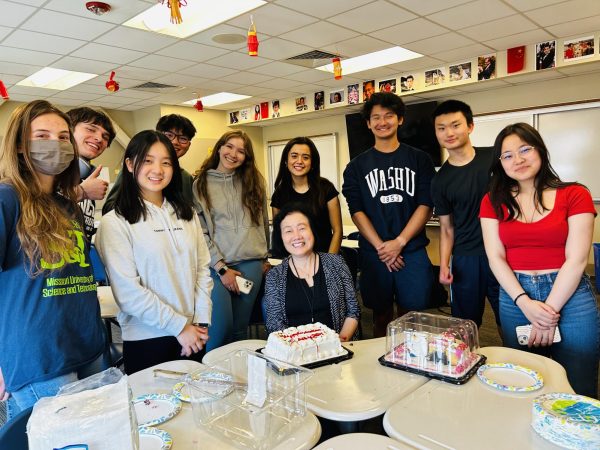Coach Ziwani
Standing in the middle of a grassy savannah somewhere in Tanzania, future CHS history teacher Paul Hoelscher stared at the small building in the distance.
“Wow, this is cool. This is where I’m gonna be for the next two years.”
That is what Hoelscher thought when he skipped Swahili school to check out his new job in East Africa.
Now, about 20 years later, he is beginning his 16th year at CHS with a new title. While Hoelscher says it “doesn’t feel different at all,” many students who knew their sophomore history, sports history, or AP World teacher as “Mr. Hoelscher” are surprised to hear his new students refer to him as “Dr. Hoelscher.”
He recently finished his EdD, or Doctor of Education, in Educational Leadership at Maryville University. Rather than study a narrow, historical subject through a PhD at St. Louis University, Hoelscher’s educational degree focused on curriculum development with an individual emphasis on geography.
In addition to teaching sophomore history, AP World and Sports History, Hoelscher has another, lesser known job: K-12 Curriculum Coordinator. He will not, however, use his paper outlining his ideal geography course in this role. Instead, he plans to incorporate his research, which shows that students understand geography better in historical context than as a standalone class, into the curriculum. This means that Clayton will likely not be seeing a new geography class anytime soon, but the subject will be incorporated more into the existing six-year plan and requisite freshman and sophomore classes.
“I think kids today need to be a little more aware – actually a lot more aware – of the big world that’s out there, and geography can be an entry point into learning a little bit more about the world,” he said.
In the process of getting his EdD, Hoelscher found himself exploring topics he had never thought about before. He worked with principals and superintendents in classes focused more on the entire school system, rather than a single history class.
“I thought some of those were really interesting management classes that I’d never really taken before, never really gotten into previously,” Hoelscher said.
While his independent geography dissertation took about half of his study, Hoelscher took “a whole bunch of different classes on a wide variety of subjects”, all focused on the idea of educational leadership.
Along the way, Hoelscher found himself more captivated by some of his projects, papers and classes than others.
“I think, at some point, your education becomes what you put into it, unlike sophomore year of high school where you are doing what your teachers tell you to do. My ultimate goals were to get an opportunity to learn a little bit more, because I hadn’t been back to school for a while, and to put myself in a position down the road where it would open some doors,” Hoelscher said.
It is a goal of his to stay in the learning habit by continuing his education. He has also considered teaching undergraduate classes after retirement and decided to pursue his EdD after being told it would “open some doors in terms of teaching some undergraduate classes” outside of St. Louis.
Hoelscher has been a history teacher at CHS for 16 years.
“When I came here I felt it was just a little bit different, enough. The atmosphere was, maybe, a little more academic than some other high schools, and I felt that would be a good place for me to grow,” Hoelscher said.
After taking job, he spent the first half of his time at Clayton coaching soccer, and began to focus more on curriculum in his second half. With his two kids starting in the district, he has been able to understand the learning process from a new angle.
“I think having the kids in the district gives you an additional value or appreciation of the district, so where we are right now as a family, it’s definitely the best thing for the family,” he said.
Hoelscher’s life before Clayton, however, was a different kind of adventure.
As an undergraduate, he studied Political Science and History. Even though both his parents were teachers, he was considering law school next.
For the time being, however, he took his counselor’s advice and taught on the Navajo reservation for a year. Through Indiana University’s American Indian Project, he discovered his passion for education.
He continued to search for opportunities on the reservation after the first year, changing his mind about law school.
“Had I had a car, or a girlfriend, or anything, I would have stayed [in America]. But I had literally nothing, so that’s when I went to East Africa,” Hoelscher said.
To continue his teaching career and interest in travel and history, he taught for the UN Peace Corps for two years at a school in Tanzania called “Ziwani,” meaning “Lake Secondary School.”
Before he began teaching, however, Hoelscher needed to learn Swahili. His advisors enrolled him in language classes, but he did not exactly enjoy it.
“I was young and extremely overconfident, and didn’t necessarily want to be in that language school,” he said.
So, Hoelscher broke the rules. During a short lunch break, he walked away from language school and didn’t come back.
Instead, he trekked through the African wilderness to Ziwani.
“And, as I approached the school – you know, kind of grassy savannah, you could see the school a good half mile in the distance – as I approached the school, I got this feeling of, ‘Wow, this is cool. This is where I’m gonna be for the next two years,” Hoelscher said.
As he neared the campus, however, he overheard an argument between the headmaster and a local Tanzanian gentleman.
Smack.
The screen door slapped in Hoelscher’s face as the other man stormed out.
Thinking the introduction might resemble his future, he thought he might not fit in very well as the “tall, goofy, white guy.”
As it turned out, the man who had left was the football (soccer) coach, who quit when the headmaster, Desai, did not have enough money to pay him. Hoelscher, who had won the state championship in high school soccer at DeSmet, volunteered to lead the school’s team in the Coca-Cola sponsored Tanzanian high school tournament.
Rather than returning to Swahili school that day, Hoelscher went straight out to the soccer field and started coaching the boys.
He told them, “You don’t have to pay me anything, but you need to help me with Swahili.”
His entrance to the language came through Kiswahili cha Mtaani, which translates to “Swahili of the street.”
His group of high school students started by teaching him slang soccer terms.
Next came the other half of his vocabulary: all other normal conversation.
In the end, Hoelscher led the team to victory across Tanzania.
“Dumb luck – I’m sure I wasn’t a good coach, they were just good players,” Hoelscher said.
That aside, he took a group of high school kids who had never left their small village to a tournament in a different country.
“So, in my first, basically, two months of teaching and working in that community, I went from language school to being the coach of the team from the village that had never won before,” Hoelscher said. “It was pretty easy to get along with people after that.”
Hoelscher became known as “Coach Ziwani” rather than “Mr. Paul the teacher.”
Hoelscher continued to teach at Ziwani for two years after the tournament. He considered staying in East Africa for another two to four years, either in teaching or foreign service.
That is when he got sick.
Hoelscher came down with bilharzia (schistosomiasis), a tropical, blood-borne pathogen that enters the skin through the form of a worm. Both he and his girlfriend at the time felt fatigued and shared other symptoms, but she chose to leave while he remained in Africa.
Shortly after, she called a local Indian family, advising Hoelscher to leave the country. So, he was airlifted out.
Hoelscher first spent time in London, but soon after traveled to the Center for Disease Control in Atlanta, GA to recover.
While he recovered well from the potentially fatal illness, his white blood cell count was too low to return to Tanzania for a while.
After his six month recovery, he returned to St. Louis and decided to search for teaching opportunities.
First, however, he went for a night out with his old high school friends in St. Louis. At the time, Hoelscher, in his mid-twenties, planned to return to East Africa after about a year.
But on his very first night out back in St. Louis, he ran into his high school girlfriend. They started a relationship again, and she convinced Hoelscher to stay and teach at Parkway rather than return to Africa.
He stayed in St. Louis, and eventually married her.
This coincidence brought Hoelscher to where he is today: teaching history at Clayton High School.
“I never really thought I was gonna stay in St. Louis,” he said. “much less be a teacher for 20 years. But, it could be much worse.”
To those who do not known him, Hoelscher may seem like a just an ordinary teacher. But behind this, there is a man who won a Tanzanian soccer tournament, worked for the Peace Corps in East Africa for two years until he caught a potentially fatal disease and was airlifted out, and much more.
At this point, Hoelscher has almost too many fun and interesting stories to tell.
A $50 or more donation includes a subscription to the Clayton High School Globe 2024-2025 print news magazine.
We will mail a copy of our issues to the recipients of your choice.
Your donation helps preserve the tangible experience of print journalism, ensuring that student voices reach our community and that student democracy thrives.

Justin Guilak is a senior at CHS and has been on the Globe since his sophomore year. He is also a captain of the Cross Country team, Ultimate Frisbee Club, and Quizbowl team, as...






